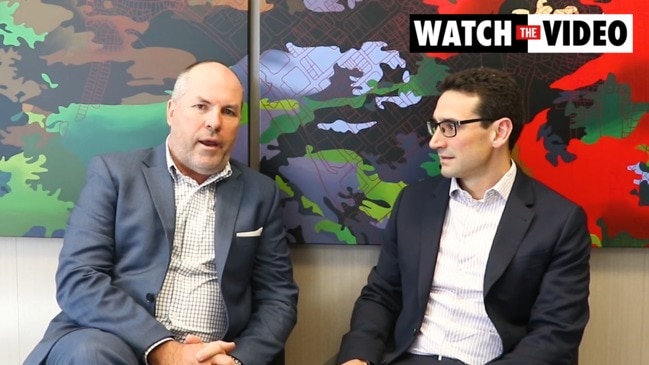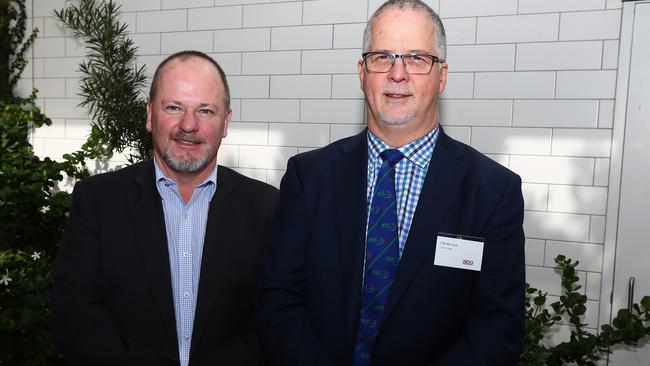Smaller ASX-listed firms face regulatory ‘minefield’
The bosses of smaller ASX-listed companies reveal mandatory box ticking designed for bigger firms is a costly exercise.

QBW
Don't miss out on the headlines from QBW. Followed categories will be added to My News.
Being a listed company had become a regulatory and politicised minefield with costly mandatory reporting required on everything from anti-slavery to gender equity.
The bosses of leading Queensland ASX-listed companies told a BDO and Queensland Business Weekly boardroom lunch that while they were all committed to being good corporate citizens, the amount of “box ticking” required to address agendas unrelated to business was increasing.
BDO Brisbane managing partner Steven Sorbello said listed companies were operating in an increasingly complex regulatory environment.
“It has become a bit of a minefield,” Mr Sorbello said.
National Storage managing director Andrew Catsoulis said his company had just completed a mandatory 30-page anti-slavery report even though it imported next to no products that could have been made in overseas sweat shops. “It is ludicrous,” Mr Catsoulis told the lunch. “About 99 per cent of our products and supplies are sourced within Australia.”
Mr Catsoulis said fewer people were now willing to sit as a non-executive director because of the risk of being liable for something that the company did wrong. “It is a minefield of liability,” he said. “You could be liable for virtually anything.”

He said most of the directors sitting on boards of ASX-listed companies weren’t doing it for the money, but because they wanted to share their experiences and knowledge.
“The risk is we will get to the stage where directors will say they don’t want to do it as there is too much liability,” he said. “They will sit in a boardroom for six hours and five hours will be box-ticking and only one hour on substantive issues.”
Comet Ridge managing director Tor McCaul said that since his company listed 18 years ago regulatory oversight had become increasingly complex.
“You would have to think about whether you would proceed with an IPO today given it has become so much harder,” Mr McCaul said.
Mr McCaul also said ASX-listed firms had to be alive to the “increasingly sophisticated strategy” by interest groups of pressuring investors not to invest in companies involved in the oil and gas industry.
Mitchell Services chief executive Andrew Elf said that because his company worked in the gas sector, funds and an increasing number of banks were not prepared to invest in it. “They have no mandate to invest in oil and coal,” he said.

Sunland chief financial officer Grant Harrison said that when the Gold Coast property developer listed a quarter of a century ago, it was a way to develop a higher level of due diligence and access capital both from the market and the banks.
“I would question whether it is the best option now given the hurdles,” he said. “These days there are other sources of capital and you don’t really need public money.”
Apollo Tourism and Leisure chief executive Luke Trouchet was more upbeat about the caravan and camper van company’s listing on the ASX in 2016.
“We listed because we were a family owned business that wanted to have access to capital,” said Mr Trouchet. “We also wanted liquidity because it was just my brother and I running the business as well as an opportunity for staff to invest in the business.”
Healthia chief financial officer Chris Banks said compliance costs were rising for listed companies and he would question whether small firms had the resources to meet the requirements. Mr Banks said it was not just the listing costs but lawyers and consultants needed to prepare regulatory and compliance reports.

National Storage’s Mr Catsoulis said he was in favour of gender equity but it could not just be a matter of filling quotas.
ASX-listed companies have been required since 2010 to disclose in each annual report the proportion of women across the organisation in senior management and in board positions.
“If you are expanding your board just for the sake of political correctness or gender diversity it can end up in disaster,” he said.
The push for diversity was now being extended with Mr Catsoulis recently receiving a letter from an investment fund asking what the company was doing in “relation to ethnic diversity.”
But he said cultural diversity mean different things to different people.
Human resources departments were increasingly wanting to restrict romantic relationships between employees because of the risk of litigation down the track.



